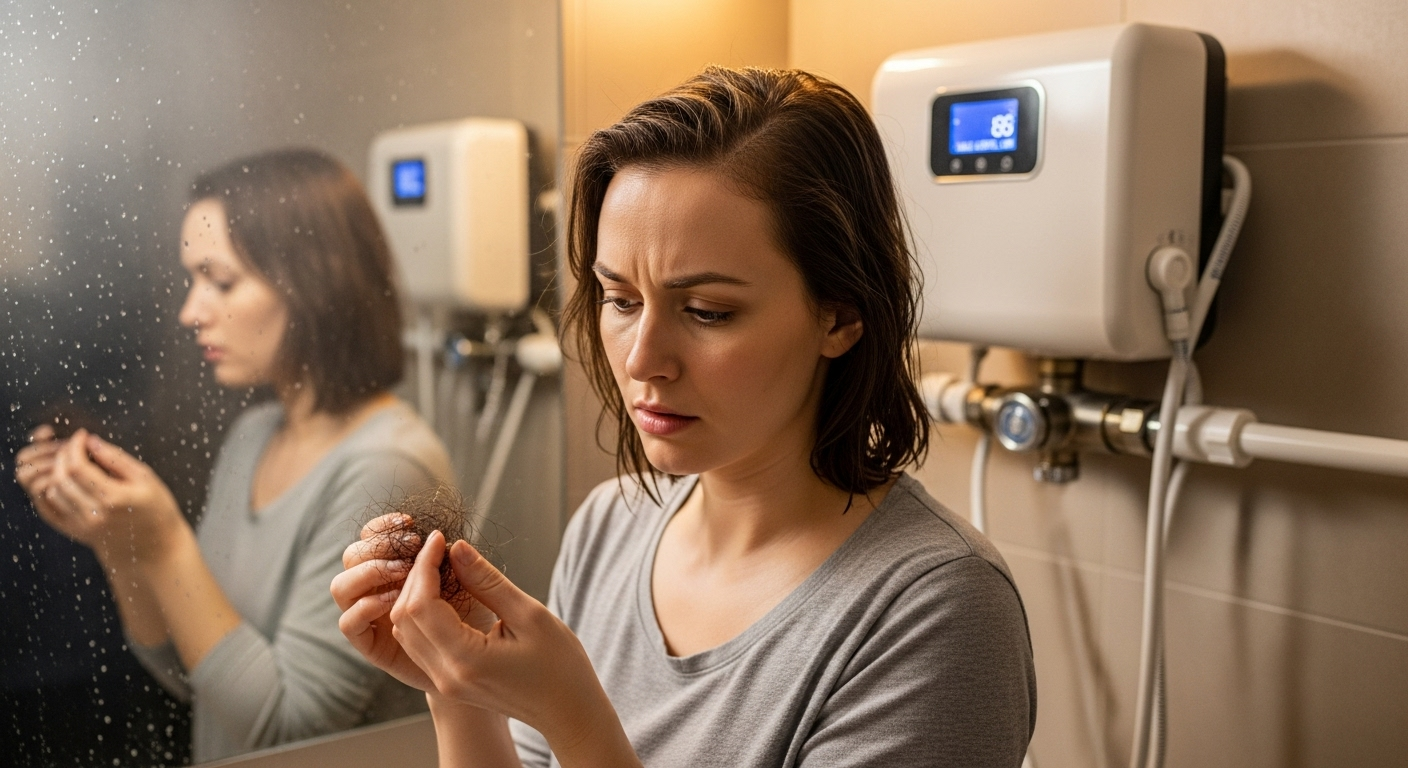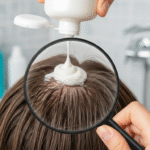Can Water Softener Cause Hair Loss?If you’ve noticed changes in your hair after installing a water softener, you might be wondering if it’s the cause. While hard water is often linked to hair damage, soft water’s impact is less clear. This article explores the relationship between water softeners and hair health, clarifying whether they contribute …
Can Water Softener Cause Hair Loss?If you’ve noticed changes in your hair after installing a water softener, you might be wondering if it’s the cause. While hard water is often linked to hair damage, soft water’s impact is less clear.
This article explores the relationship between water softeners and hair health, clarifying whether they contribute to hair loss and offering practical advice for maintaining your hair’s health. By reading this, you’ll understand how soft water affects your hair and what you can do to prevent potential problems.
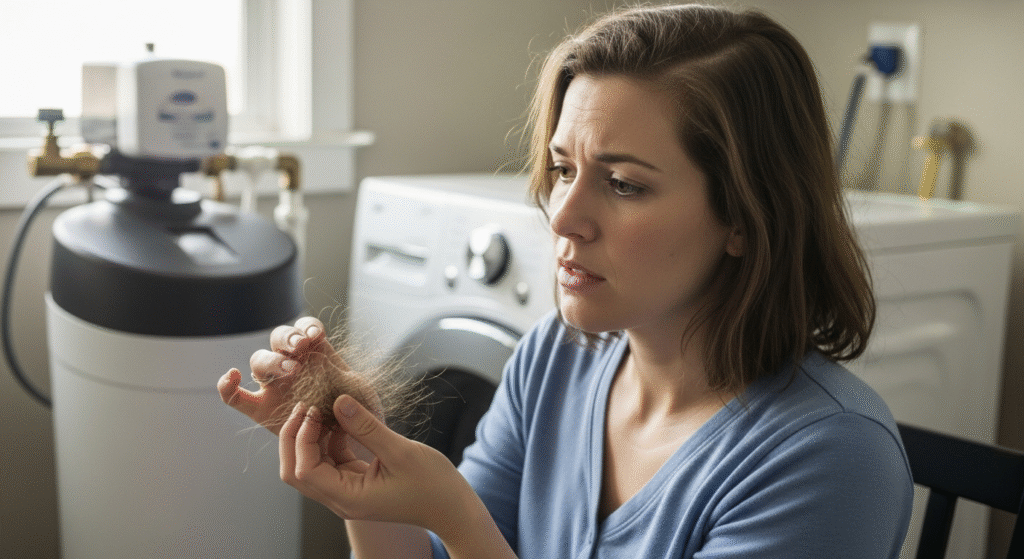
What Is Water Softening?
Water softening is a process designed to remove minerals, primarily calcium and magnesium, from water. These minerals contribute to “hard water,” which can leave residue on your skin and hair, clog pipes, and cause damage to appliances. Soft water, on the other hand, contains fewer of these minerals, making it gentler on plumbing and skin.
- How Water Softening Works:
- Ion Exchange: Hard water minerals are replaced by sodium or potassium ions, softening the water.
- Effect on Hair: Soft water is generally thought to be more beneficial for hair as it doesn’t leave the same mineral buildup as hard water.
However, some people report changes in their hair after switching to soft water, raising concerns about whether it could be linked to hair loss.
The Myth: Can Water Softener Cause Hair Loss?
Many people mistakenly associate soft water with hair thinning or hair loss. However, there’s no scientific evidence to support the claim that water softeners directly cause hair loss. Here’s what you should know:
- The Common Concern: When people switch from hard to soft water, they may notice differences in their hair texture and appearance. This can be perceived as thinning or hair loss, but it’s often due to changes in hair care routines or how the water interacts with hair products.
- The Real Impact of Soft Water on Hair:
- Soft water can make your hair feel smoother and softer because it reduces the mineral content that can cause build-up on hair strands.
- However, the absence of minerals can also make hair appear limp or less voluminous, which might give the impression of thinning hair, but this doesn’t equate to hair loss.
Experts agree that soft water is typically gentler on hair compared to hard water, which can cause dryness and breakage due to its mineral content.
How Soft Water Affects Hair Health
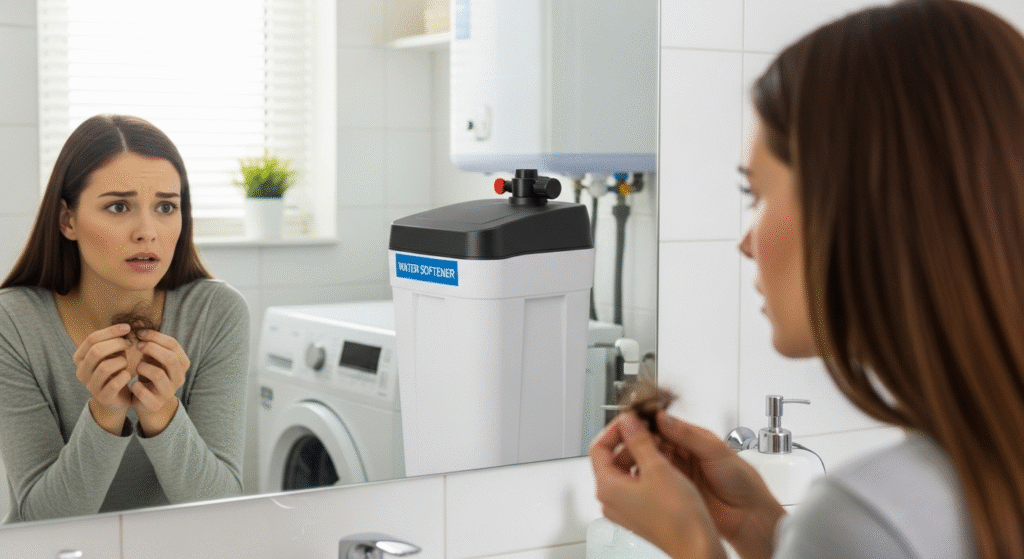
While soft water doesn’t directly cause hair loss, it can have an impact on how your hair looks and feels. Here are some ways soft water affects hair health:
- Mineral Absence: Soft water lacks the minerals that help break down and rinse off hair care products like shampoo and conditioner. This means that you may need to use a slightly higher amount of product or rinse more thoroughly to avoid build-up on the scalp and hair.
- Smoother Hair Texture: Soft water often results in smoother, shinier hair. For people with curly or textured hair, soft water can reduce frizz and make the hair feel softer. However, this effect can sometimes lead to limp hair that lacks volume.
- Product Build-Up: Without minerals in the water, conditioners and shampoos may not wash out as thoroughly, leading to a gradual build-up of product residue. Over time, this residue can make hair appear dull or heavy, though this is not the same as causing hair loss.
- Scalp Health: Soft water’s gentler nature can reduce scalp dryness, but in some cases, it may not be as effective at cleansing oils and dirt from the scalp. This can lead to clogged follicles or scalp irritation if product build-up isn’t properly managed.
Expert Insights on Water Softener and Hair Loss
While anecdotal evidence suggests that people may notice changes in their hair after using a water softener, experts agree that soft water is generally beneficial for hair health when used correctly.
- Dermatologist Insights: According to Dr. Emily Summers, a dermatologist, “Soft water can actually be beneficial for hair by preventing the mineral buildup that hard water causes. However, if you’re experiencing hair issues after switching, it may be related to other factors like product buildup or an underlying scalp condition.”
- Trichologist Opinions: Dr. Michael Jones, a trichologist, adds, “There’s no scientific evidence linking water softeners to hair loss. The key is maintaining a healthy scalp by managing product usage and ensuring that all products are thoroughly rinsed out to prevent residue accumulation.”
These expert opinions suggest that any perceived hair issues following a switch to soft water are likely related to changes in hair care routines or individual sensitivities rather than the water itself.
Addressing Hair Concerns After Installing a Water Softener
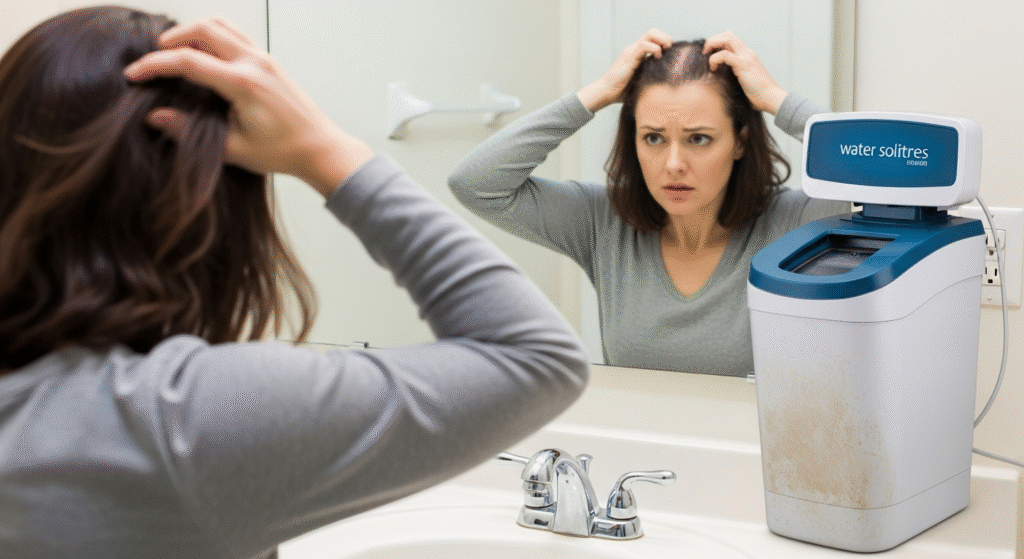
If you’ve noticed changes in your hair after installing a water softener, here are some steps to address the issue:
- Clarifying Shampoo: If you feel like your hair has buildup from conditioners or other products, using a clarifying shampoo once every 2–3 weeks can help remove residue. Be cautious not to overuse clarifying shampoos, as they can strip your hair of moisture.
- Scalp Care: Regular scalp massages can promote healthy circulation and ensure that hair follicles remain clear of any product buildup. A healthy scalp is crucial for supporting hair growth.
- Adjust Your Hair Care Routine: With soft water, you might not need as much conditioner or shampoo as you used with hard water. You may also find that you need to rinse your hair for a longer time to ensure all products are washed away.
- Choose the Right Hair Products: Light, gentle shampoos and conditioners are ideal for soft water, as heavy products may lead to buildup more easily.
FAQs
Can soft water cause hair loss?
No, soft water does not directly cause hair loss. However, changes in hair texture or volume may occur due to the absence of minerals or product buildup.
Does soft water make hair look thinner?
Soft water can make hair appear smoother and less voluminous, but it does not cause thinning. This may be due to the lack of minerals that hard water provides, which helps add texture.
Should I rinse my hair more thoroughly with soft water?
Yes, because soft water may leave product residue behind. Ensure you rinse your hair well to avoid buildup.
How can I prevent hair problems with soft water?
Use the right amount of shampoo and conditioner, rinse thoroughly, and consider using a clarifying shampoo occasionally to remove product buildup.
What can I do if my hair feels limp after using soft water?
Try adjusting your hair care routine by using lighter products or incorporating volumizing treatments.
Conclusion
Soft water itself doesn’t cause hair loss, but it can affect how your hair feels and looks. While it is gentler on your hair compared to hard water, overuse of hair products or insufficient rinsing can lead to product buildup, which may give the appearance of hair thinning.
If you’ve noticed changes in your hair or have concerns about the effects of soft water, book a consultation with Dr. Uzma Irfan, an ISHRS-certified surgeon in Islamabad today, We’ll assess your hair and scalp health and provide personalized recommendations to help you maintain vibrant, healthy hair.

